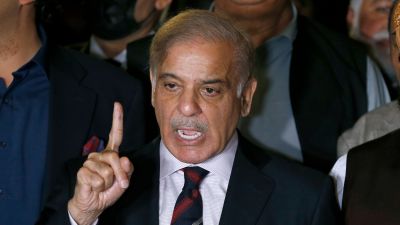Pakistan parliament vote in new Prime Minister Shahbaz Sharif after ousting Imran Khan

Pakistan's parliament has voted in opposition leader Shahbaz Sharif as the nation's new prime minister, after Premier Imran Khan was ousted on Sunday.
The former cricket star was booted out of office after he failed to survive a no-confidence vote in his leadership.
“Mohammad Shahbaz Sharif is declared to be the prime minister of the Islamic Republic of Pakistan,” announced the acting speaker, Asad Sadiq.
Mr Sharif ran unopposed and was elected with 174 votes cast in his favour.
The brother of disgraced former Prime Minister Nawaz Sharif, his administration faces Pakistan’s mounting economic problems, including high inflation and a soaring energy crisis.
How does the political landscape look in Pakistan?
The former opposition will now run a truncated house with a small majority of 174 lawmakers, which is enough to pass laws in the 342-seat assembly.
Political drama in Pakistan kicked off on April 3 when then prime minister, Imran Khan, sidestepped an initial no-confidence vote.
Initial calls for the vote came after Khan had dissolved parliament and called for early elections.
The former opposition, who have accused Mr Khan of economic mismanagement, appealed to the Supreme Court and after days of deliberation, parliament was re-instated and a no-confidence vote went ahead.
What you need to know - Listen to our news podcast
Mr Khan was ousted on Sunday and has claimed opposition leaders colluded with Washington to remove him from office.
He has cited his independent foreign policy, which favours China and Russia, as the main driving force behind his claims.
He was also criticised for a visit he made on February 24 to Moscow, where he held talks with Russian President Vladimir Putin as Russian tanks rolled into Ukraine.
The US State Department has denied any involvement in Pakistan’s internal politics.
Family and politics in Pakistan: What do we know about the countries new PM?
Shahbaz Sharif has served three times as chief minister of Pakistan's largest, most influential Punjab province, where 60% of the country's 220 million people live.
His son Hamza was elected by the Punjab provincial parliament last week as new chief minister, ousting Khan's nominee. Mr Khan's party is challenging that election and the younger Mr Sharif has yet to be sworn in.
In Pakistan, a few wealthy and powerful families have dominated politics for decades, with power most often alternating between the Sharif and the Bhutto camps.
Both political houses have been accused and at times convicted of widespread corruption — and both have denied the allegations.
The two largest parties are the Pakistan Muslim League, headed by Shahbaz Sharif, and the Pakistan People's Party, co-chaired by the son and husband of slain ex-Prime Minister Benazir Bhutto.
Nawaz Sharif was unseated by the Supreme Court in 2015 after being convicted in connection with financial irregularities revealed in the so-called Panama Papers — a collection of leaked secret financial documents showing how some of the world’s richest hide their money and involving a global law firm based in Panama.
He was disqualified by Pakistan’s Supreme Court from holding office.
Asif Ali Zardari, Bhutto's husband who served as president of Pakistan after the 2008 elections, has spent more than seven years in prison, convicted on corruption charges.
Both families have dismissed corruption allegations against them as being politically motivated.
Mr Khan came to power in 2018, promising to break family rule in Pakistan but his opponents claimed he won the elections with help from the powerful military, which has ruled Pakistan for half of the country's 75-year history.
Nawaz Sharif was also ousted in 1999, in a military coup, and Benazir Bhutto's government was ousted several times after the military sided with her opposition. In Pakistani politics, where loyalties are often fluid, Ms Bhutto's fiercest opposition often came from Sharif's party.
'imposed government': Imran Khan calls on supporters to take to the streets
With political uncertainty ahead, Mr Khan rallied hundreds of thousands of supporters late Sunday to protest his ouster.
He describing the next government as an “imposed government.”
In cities across Pakistan, Mr Khan's supporters marched, waving large party flags and vowing support. The youth, who make up the backbone of Khan’s supporters, dominated the crowds.
Some were crying, others shouting slogans promising Khan's return.